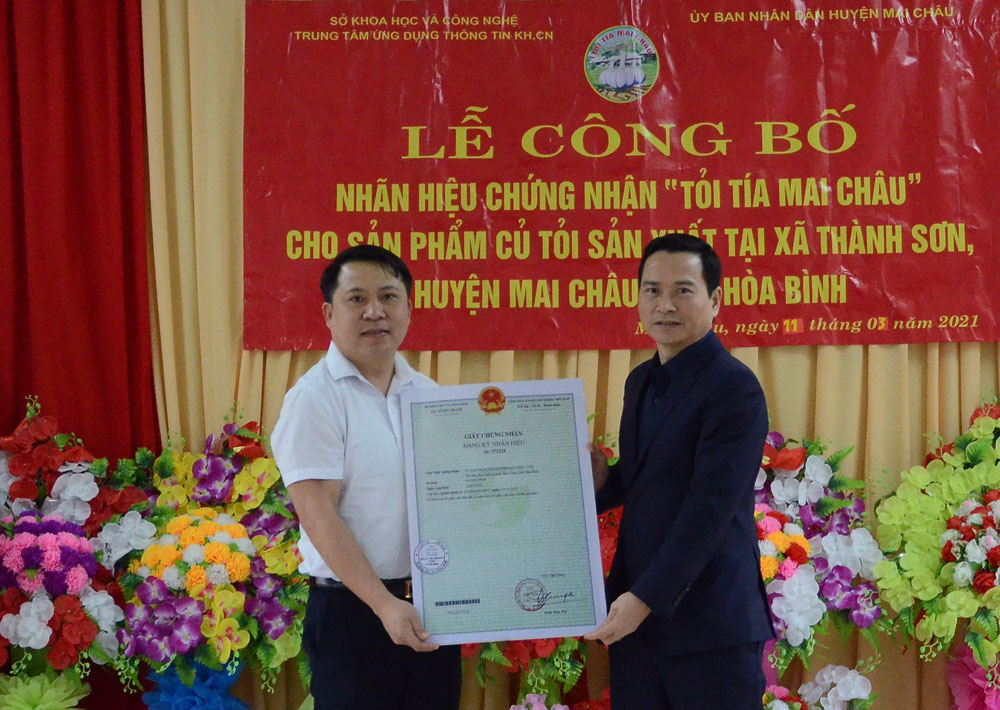
(HBO) - The People’s Committee of Mai Chau district of Hoa Binh province on March 11 held a ceremony to hand over a certificate recognising a garlic variety grown in Thanh Son commune as Mai Chau purple garlic collective brand.
 Leaders of the provincial Department of Science
and Technology hand over the certificate to the Mai Chau People’s Committee.
Leaders of the provincial Department of Science
and Technology hand over the certificate to the Mai Chau People’s Committee.
The variety
has been cultivated in Thanh Son commune for a long time. The plant has small
bulbs, purple sheath and yellow cloves containing a large amount of oil, and a
spicy and delicious flavour.
It is a
Vietnamese specialty suitable for planting in Thanh Son’s climate and soil. The
commune is home to about 12 ha of purple garlic that is often planted in August
and September and ready for harvest more than three months later.
Along its
stem, the part near the bulb is purple, while the bulb turns beige after
harvest. One gram of the garlic contains a high amount of allicin of between
6.81 and 7.23 mg.
The garlic
was recognised as a collective brand by the National Office of Intellectual
Property of Vietnam at the Ministry of Science and Technology under Decision
102266/QD-SHTT dated December 3, 2020.
The
recognition helps affirm the brand of Mai Chau purple garlic and serves as a
foundation to raise its prestige and at the same time promote the product to
targeted markets.
Products earning
the title include those grown and processed in Thanh Son that meet criteria of
quality and related services (buying and selling of garlic).
Mai Chau
district also joined hands with the provincial Department of Science and
Technology in building database, origin tracing system and smart QR stamp for
its products.
At the
handover ceremony, the Mai Chau People’s Committee presented the certificate
stating the right to use the Mai Chau purple garlic collective brand to 30 outstanding
families in Thanh Son. The farmers pledged to capitalise on chances brought
about by the recognition and follow instructions to maintain, protect and
improve product quality as well as intellectual property issues.
Samples of Mai Chau purple garlic recognised by
the National Office of Intellectual Property of Vietnam at the Ministry of
Science and Technology./.
Dao Village’s honey – a product certified with a 3-star OCOP (One Commune One Product) rating by Thong Nhat Agricultural Cooperative in Dao Village (Hoa Binh City) – is highly regarded by consumers for its quality, richness, and variety in packaging. The distinctively sweet taste of Dao Village’s honey leaves a lasting impression on anyone who has tried it.
In alignment with Project No. 07-DA/TU, issued by the Hoa Binh provincial Party Committee on November 1, 2021, Lac Thuy district has actively promoted investment and supported the sustainable development of its industrial and handicraft sectors during the 2021–2025 period. Alongside this, the district has remained committed to preserving and revitalising traditional craft villages.
Located in the northern part of Lac Thuy district, with a temperate climate and fertile soil, Phu Thanh commune has great potential and advantages in growing tea. The long-standing experience, combined with strict adherence to organic farming practices in the tea gardens, ensures that the dried tea products from Phu Thanh and Lac Thuy as a whole are sold out immediately upon production, providing a stable and prosperous life for the local people.
Amid efforts to streamline the administrative apparatus, Hoa Binh province has intensified measures to address challenges in land clearance, resettlement support, and infrastructure investment, aiming to speed up the progress of key projects.
Hoa Binh province has posted an unprecedented economic growth rate of 12.76% in the first quarter of 2025, marking its highest quarterly performance to date and positioning it as the second fastest-growing locality in the country, trailing only Bac Giang province.
Under current regulations, products in the One Commune – One Product (OCOP) programme that are rated three stars or higher must undergo re-evaluation every three months. However, in reality, some of these products fail to consistently meet the required standards, raising concerns about the sustainability of their OCOP certification. This underscores the urgent need for producers to enhance product quality and gradually develop their OCOP products into strong, marketable brands.



 Leaders of the provincial Department of Science
and Technology hand over the certificate to the Mai Chau People’s Committee.
Leaders of the provincial Department of Science
and Technology hand over the certificate to the Mai Chau People’s Committee.